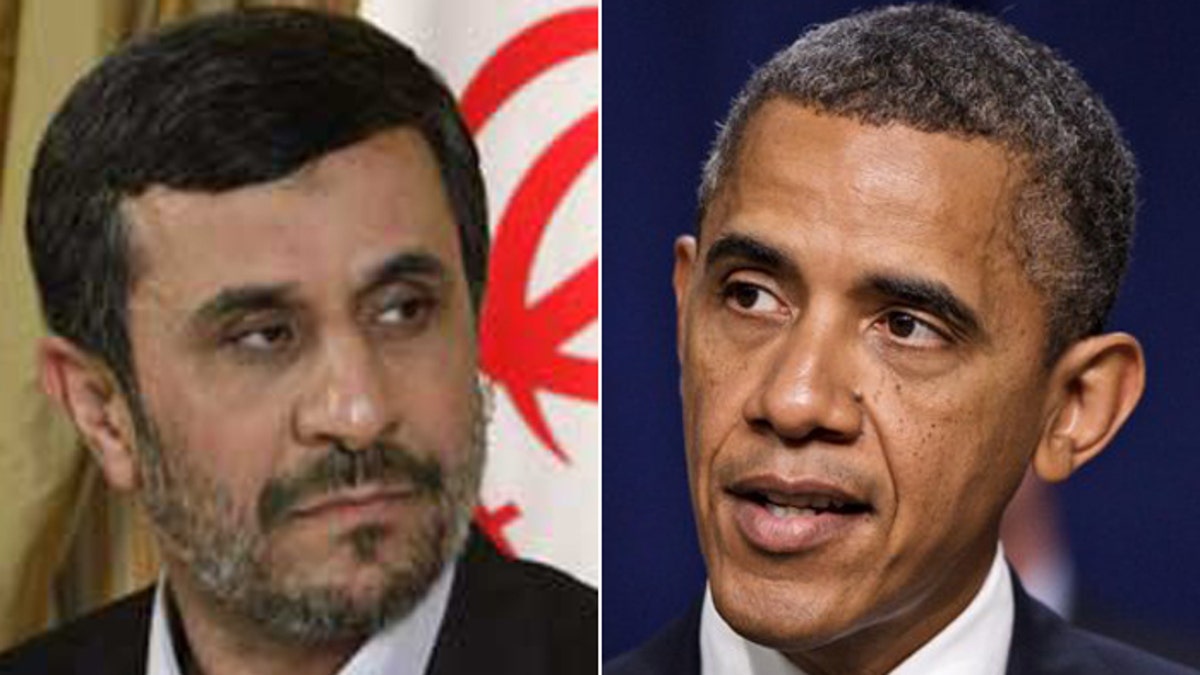
Iran's rogue regime tells Obama administration not to expect
President Obama's efforts to isolate Iran’s rogue regime is drawing a cool response from some key European lawmakers, who may be putting trade over principle.
A group of German members of parliament arrived on Sunday in Iran, including a representative of German Chancellor Angela Merkel’s Christian Democratic Union party, and was slated to meet with the local chamber of commerce and Mohammad Javad Larijani, the head of the Iranian human rights council. He is the official who justified the stoning of women as punishment and called for Israel's destruction.
[pullquote]
Wahied Wahdat-Hagh, a German-Iranian expert on the Islamic Republic and EU-Iran relations, said such trips to Iran are “a failure of the sanctions of the EU and of Obama, of transatlantic cooperation and of a common European policy."
Yet another group of parliament members from European Union countries was planning a diplomatic mission to Iran over the weekend, but canceled it when Tehran refused to allow them to bestow an award on a human rights dissident. Still, the group was more than prepared to give Iran a photo op and snub two U.S. senators who had implored them not to go, not to mention Obama.
“Sending a delegation to Iran for a seven-day visit sends the wrong message at this particularly sensitive time,” Sen. Jeanne Shaheen (D-N.H.) and Sen. Ben Cardin (D-Md.) wrote in a letter to head of the EU parliament.
The trips undercut President Obama's effort to present a uniformed, international front against Iran as it thumbs its nose at efforts to scuttle its nuclear program. Obama touted the sanctions, which have caused runaway inflation in Iran and put pressure on Tehran, at his final debate with Mitt Romney earlier this month. Romney said he would ratchet up the pressure to place Iran’s clerical leadership in an economic and political vice.
"I would tighten those sanctions," Romney said at the debate. "I would say that ships that carry Iranian oil can't come into our ports. I imagine the EU would agree with us as well.”
Romney added that he would ensure that Iran’s “diplomats are treated like the pariah they are around the world, the same way we treated the apartheid diplomats of South Africa.”
The trips don't just anger U.S. leaders. Struan Stevenson, a conservative Scottish MEP who heads the parliament’s Friends of a Free Iran caucus, tweeted in advance of the canceled trip, “Scandalous European parliament will send a large ‘friendship’ delegation to Iran, end October, bolstering this evil regime. CANCEL.”
The trip was canceled at the eleventh hour because Iran’s clerical regime rejected the EU pre-condition the delegation be allowed to deliver the EU’s Sakharov Prize for Freedom of Thought to imprisoned Iranian human rights lawyer Nasrin Sotoudeh and filmmaker Jafar Panahi, who is under house arrest.
Alan Mendoza, the director of the London-based think tank Henry Jackson Society, said the sanctions can't work if everyone isn't on board.
"It's difficult to see how current sanctions policy is going to bring results on the economic front," Mendoza said. "Iran is being slowly squeezed and is therefore able to react to every new sanctions round and mitigate its worst effects.“
Mendoza called for "measures that would work together immediately and form a complete EU-U.S. trade embargo, cutting off both Iran’s Revolutionary Guard Corps and the Iran-linked Lebanese terror group Hezbollah.
"A big bang impact like this would force Iran's hand," Mendoza said.
Iran’s Revolutionary Guard Corps ( IRGC) controls at least half of Iran’s companies and oversees its illicit nuclear activities and ballistic missile program. The EU has showed no appetite for a ban of the IRGC, which President Bush outlawed in 2007.
The European-Iranian bi-lateral trade relationship hovers around 25 billion euros each year, which gives the Europeans significant leverage over Tehran. Obama, however, provided Iran sanctions waivers in September to Europe’s energy sector and has not made any major push to compel the EU to blacklist the IRGC.
Wahdat-Hagh termed German policy as “capitulation toward the totalitarian Iranian dictatorship” and stressed that Berlin is pursuing only its business interests at the expense of isolating Iran.
When asked if the German trip is undercutting Obama’s multilateral strategy, Ruth Bennett, a spokeswoman for the U.S. Embassy in Berlin, said, ”we do not have a comment.”
Benjamin Weinthal is a Berlin-based journalist and a fellow at the Foundation for Defense of Democracies.
